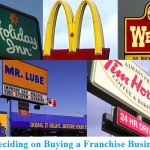
Meanwhile, there are some disadvantages of this kind of business. The greatest one is that retailers have to operate under strict operational requirements and specifications defined by the franchisor. Obviously, when you decide on whether to purchase a franchise business, you must consider all the pros and cons of this deal. In this article, let’s try to resolve this issue. We’ll focus on the addressing questions:
- What is a franchise?
- What are the pros and cons of buying a franchise business?
- How to invest in and control a franchise?
Franchise Definition
In terms of business planning, a Franchise is a method of establishing and developing sales relationships between a supplying company (the franchisor) and an independent, third party retailer (the franchisee) for distributing franchised products or services through using an existing retail network of the franchisee. The franchisor grants the right to sell the products/services within a certain territory or location and under specific requirements and conditions. The franchisee gets the right to operate under the trademark and follow the business concept and model identified by the franchisor.
Business franchising relationships require independent operators to pay an initial fee and royalties to the owner of the franchise. They are allowed to use the marketing methods, brand names, and image of the franchisor to operate in their markets. Let’s view the key responsibilities of the franchisor and franchisee.
The Franchisor Role
A franchisor owns the trademark(s) and operating system for a business. The franchisor role includes these key duties:
- Provide the franchisee with necessary instructions, tools and guidance on how to operate the system and make the business successful.
- Assist the franchisee in growing and developing the business.
- Put in place many of the boundaries and requirements for operating the franchise.
Remember that a franchisor is not the manager of the business, so they do not take responsibility for risks. Their role is to provide guidance and support to make the franchise a success.
The Franchisee Role
A franchisee purchases the right to use another organization’s business model, trademarks and brands. The franchisee role includes the following key responsibilities:
- Pay for start-up costs
- Manage day-to-day activities and operations
- Take care of marketing
A franchisee can read all the duties and responsibilities in the Franchise Disclosure Document (FDD) that determines the rights and obligations of the franchise buyer. This formal document underlies the Franchise Agreement signed between the seller and the buyer of the business franchise.
Buying a Franchise Business: The Pros
Today franchising is a popular way to start a new business venture. Buying a franchise business becomes popular because it is convenient and safe for retailers. Meanwhile, dependence on the franchisor’s requirements and demands makes this opportunity unacceptable for some businesses. Let’s view the pros and cons of purchasing a franchise business.
- Using turnkey solutions provided by the franchisor.
- Simplicity in making financial operations due to standardized accounting systems.
- Increased sales due to collective buying power.
- Excellent support and maintenance through available supervision and consulting.
- Organization of advertising and promotion campaigns through the centralized marketing programs.
- Improvements and renewal through ongoing research and development sponsored by the franchisor.
- Financial assistance and guidance.
- Sales and inventory assistance.
- Standardization of products and systems.
Buying a Franchise Business: The Cons
- Lack of control over business development and growth.
- Dependence on the requirements and specifications stated by the franchisor.
- A binding contract that prohibits taking any business initiative that is out of the contracted terms and conditions.
- Binding to the franchisor’s problems and risks
As you can see, franchising brings both advantages and disadvantages to independent business owners. You need to consider the pros and cons of buying a franchise business to make your final deliberate decision. If you are ready to operate your business under strict requirements and feel lack of control, then perhaps franchising will suit your needs. But if you want more independent business relationships and feel freedom in making strategic and tactical decisions, then obviously purchasing a franchise business is not your choice.
Investing and Control
Investing in a franchise means paying the franchise owner for rights of using the already-successful business model. In order to become a business franchisee, an individual or organization must first pay for training, equipment and tools required by the franchiser. The payment will be the royalties the franchisee is obliged to make to the franchise owner, either on a monthly or quarterly basis. The royalties are usually calculated as a percentage of the franchise operation’s gross sales.
When the first payment is done, the parties sign an agreement. Then the franchisee can open a replica of the business, under the direction of the franchiser. The franchisee will not have “full control” over the business but will benefit from from investing in an already-operating brand.
The franchiser requires the franchisee to keep the business “as is”. It means any modification and change to the established business model and trademarks are forbidden. For example, the franchiser requires use uniforms, selling methods, and logos particular to the business itself only. In such a way, the franchiser controls the integrity of the business.
The franchisee is obliged to use the same process models in the business practice. They are also required to use the same or similar pricing policies in order to keep the advertising streamlined. Meanwhile, the franchisee remains independent in making operational and tactical decisions regarding sales.